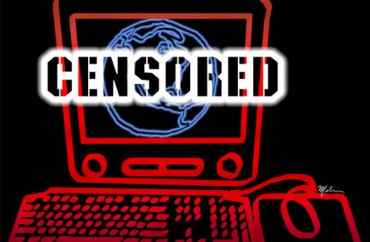
It’s never a good sign when lawyers think basic political freedoms are subject to the whims of the IRS.
Georgetown Law Center in DC, which is suffering through an interminable highway construction project about 20 feet from its back door, has decided that its students won’t mind more suffering in the form of stifled speech – in person or on the Internet.
Since September it has prevented students who support Democratic presidential candidate Bernie Sanders from distributing campaign material and primary voting information – tabling either inside or outside, the Foundation for Individual Rights in Education said in a Monday letter to Dean William Treanor:
An [Office of Student Life] representative asked the students to cease their activities and remove their materials because engaging in such campaign-related activities was not permitted. After the students asked the representative to confirm that they were not allowed to engage in this activity on campus, Coordinator of Student Organizations Kenrick Roberts came out to the table and confirmed that campaign-related activities were not permitted on campus.
The law school claims that its tax-exempt status is threatened if it lets students engage in campaign-related activities on campus or use university resources for political activity.
If I’m correctly reading this email from Roberts to student Alexander Atkins, a Sanders supporter who first sought to table inside, Georgetown Law prohibits students from even using the school’s computer network and email system for campaign-related activity:
[A]s it relates specifically to candidates for office, campaigning and solicitation, including transmission of campaign materials over the internet, leaflet distribution, and display of posters, is not allowed anywhere on Law Center property or using University servers or equipment.
Roberts cites the school’s “Student Organization Policy on Partisan Political Activities” – yep, it totally bans “partisan political campaign activity” anywhere on campus, “Georgetown’s phone system, computer networks or servers, or postal service” (how quaint).
FIRE corrects the record for the dumb-dumbs in OSL:
Georgetown Law fails to recognize the distinction between institutional expression and that of individual students and student organizations, which are strongly presumed to speak only for themselves and not their institutions. Provided that students and student organizations comply with relevant policies applied in a content-neutral manner to all individuals and groups, the university does not face a threat to its tax-exempt status by permitting them to engage in partisan political speech.
This is basic Supreme Court jurisprudence, FIRE says, citing a 2000 case involving the University of Wisconsin System:
The Court noted that when speech is “financed by tuition dollars,” with “the University and its officials . . . responsible for its content,” then it “might be evaluated on the premise that the government itself is the speaker,” but it may not be evaluated this way when the expressive activity springs from student groups funded by a student activity fee intended for “the sole purpose of facilitating the free and open exchange of ideas by, and among, its students.”
And the IRS itself makes the distinction! Georgetown Law is fine as long as “the facilities are provided on the same basis … to other non-political groups and … on an equal basis to similar groups.”
You’d think a bunch of lawyers would understand this distinction, but there’s no indication from FIRE that any of the professors raised their voices against this ludicrous and ignorant policy.
Maybe the public shame – coupled with FIRE’s kind offer to help Georgetown revise its policy so it’s not a speech-clubbing Kraken – will lead these purported legal experts to actually study and apply the law.
Like The College Fix on Facebook / Follow us on Twitter
IMAGE: M3Li55@/Flickr
Like The College Fix on Facebook / Follow us on Twitter







Please join the conversation about our stories on Facebook, Twitter, Instagram, Reddit, MeWe, Rumble, Gab, Minds and Gettr.